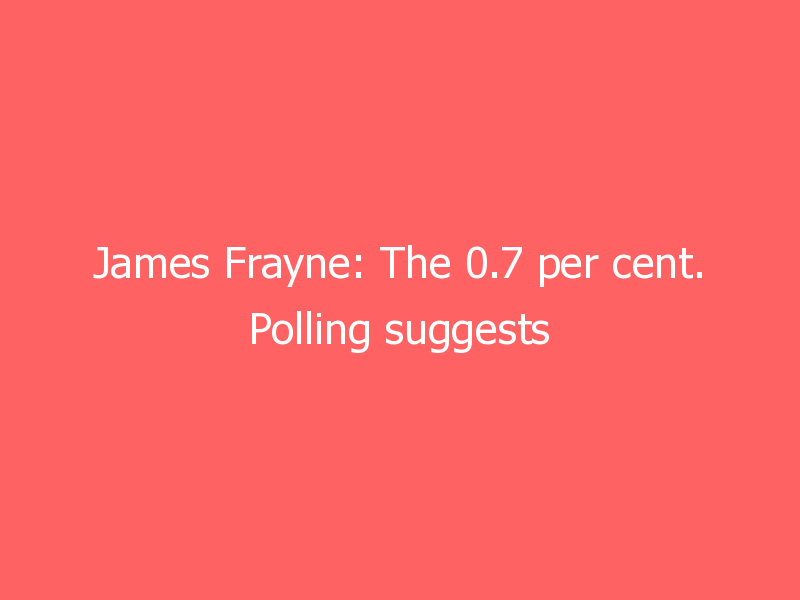James Frayne: The 0.7 per cent. Polling suggests that the Tory rebels should aim to bring it back later – not save it now.

James Frayne is Director of Public First and author of Meet the People, a guide to moving public opinion.
The public row over the Government’s intention to suspend its 0.7 foreign aid commitment will likely become an intra-party row in the coming weeks. It seems assured that at least some Conservative MPs will rebel against the decision. How big this revolt gets will depend in part on MPs’ reading of party opinion and general public opinion. So what does the research say?
The last poll question directly on this issue was asked by YouGov in November. The results were clear: 92 per cent of 2019 Conservative voters support the reduction; and 66 per cent of the public overall, with 18 per cent opposed (and the rest unsure). The only group to oppose the decision was 18-24 year olds, narrowly by 35 per cent to 30 per cet (the rest unsure). Labour voters support the decision by 44 per cent to 37 per cent and Remainers by 51 per cent to 34 per cent.
While the Government’s justification for the suspension of the target will ultimately be Covid – and the reality of the pressures on the public finances – this doesn’t appear to be a feature of people’s consideration. Given a list of options, in December just two per cent of those polled said they thought the Government should spend more on foreign aid; while 59 per cent said they thought the Government is spending too much money on aid. But these figures have barely changed over the last 18 months.
Interestingly, the need to cut aid has not been a significant feature of focus groups over the last year. My sense is this is because the public has, as I’ve argued before, been living on “furlough morphine” and doesn’t yet appreciate the nature of the financial correction that will be required.
We should assume that, if the Government were to connect the dots for the public and to make this case aggressively, as they will, this will become more of a feature of public discourse. While the reduction is minimal, people will still support it as it sounds like a tangible cut.
It is often said that the polls on 0.7 per cent are misleading: the point being that people say they oppose 0.7 but wouldn’t vote on the issue particularly, and also that abandoning 0.7 is something of a cultural signifier – i.e: it shows to soft Conservatives (to simplify, middle class, urban Remainers) that the party is narrow-minded and nationalist. My sense on this is that the first is wrong but the second is right.
By this, I mean that I suspect, when the argument is made by the Government that tighter public finances requires a suspension of the target, it will make the decision more important to most people – in other words, they will actually actively endorse it. YouGov polling shows the public have declared strong feelings on aid for some time. Given a long list of public policy options in a 2017 poll – from extending devolution to raising income tax – “sharply reducing spending on overseas aid” came fourth, narrowly behind reducing immigration. It was similarly fourth in 2015, too.
However, I suspect the very act of the row and its increased visibility will be off-putting to many people, and that opposition will grow somewhat. We see this all the time; Brexit in many ways is the ultimate example: twenty years ago, anti-EU sentiment came, in campaign terms, primarily from the left. But the UKIP surge and the shift towards a more patriotic / nationalist anti-EU argument turned many anti-EU voters into pro-EU voters.
The same will happen here; many people – particularly amongst the upper middle class – primarily define themselves by who they’re not, and there will likely be mini surge of support for 0.7 per cent. The two are compatible; there will be a hardening of support for suspension, but opposition will also grow – with “Don’t Knows” further squeezed.
What does all this mean for likely Government action? Most likely, that they stand firm on not meeting the target this year and, within reason, that they don’t seek to play the decision down and tick the “no publicity” box.
However, what may change is how they approach the suspension of the target – either by building in a sunset clause, and committing to returning to 0.7 per cent in the future, or by avoiding a parliamentary vote (and risk of rebellion) altogether. (The legislation enshrining 0.7 per cent allows the Government to miss the target if there has been a substantial change in the country’s income and this would be a simple case to make). Regardless, I suspect they will also temper their own language on this and seek to discourage the right of the party from apparently dancing on the grave of the 0.7 per cent.
And what does this mean for the rebels – in the Conservative Party and elsewhere? I’m less clear on what they’ll do, as the coalition is so much broader. However, my advice is this: meeting 0.7 in the next fiscal year is done; so their efforts should be directed into either setting an achievable target for its return or, even better, persuading the Government to take the non-legislative route in exchange for acquiescing to a 2021 cut.
The danger of not striking a deal now is that a vote on bringing the target back will be an even harder battle to win: after all, for the next decade at least, money will be tight; the Government will have to justify to voters a return to 0.7 per cent at a time when, say, it is restricting NHS, education and police budgets.
This brings us back to the main point, which even occasional readers will be bored of reading here: restoring the target in the longer-term means the development movement finally needs to talk to working class and lower middle-class voters and make the case to them.
It will be hard to achieve medium-term progress on aid with the sort of opposition to 0.7 per ceent that we see amongst the Conservatives’ new core. In addition, not a cheery thought, but there’s another serious challenge coming slowly down the line: what support there is amongst the working class is going to be slowly eroded by this cultural critique of the aid charities that ordinary people love – like Comic Relief.
Originally found on Conservative Home Read More








